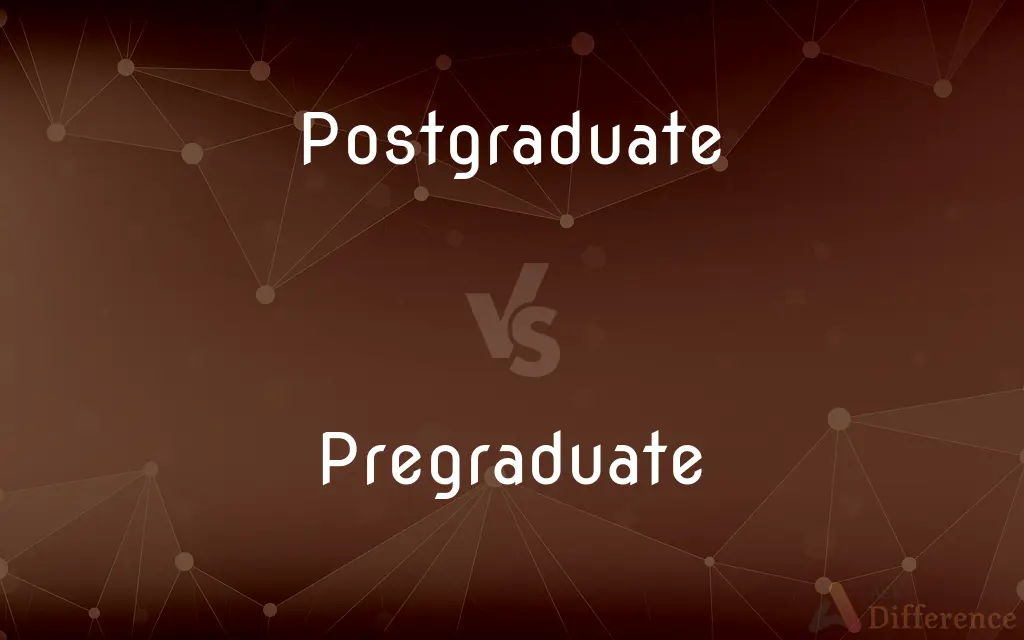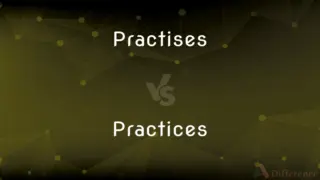Postgraduate vs. Pregraduate — What's the Difference?
Edited by Tayyaba Rehman — By Fiza Rafique — Updated on March 9, 2024
Postgraduate refers to academic studies pursued after completing a bachelor's degree, focusing on specialized education, while pregraduate is not a standard term but may imply the period or status before completing undergraduate studies.

Difference Between Postgraduate and Pregraduate
Table of Contents
ADVERTISEMENT
Key Differences
Postgraduate education includes master's, doctoral, and various professional degrees, emphasizing advanced knowledge and research in a specific field. Pregraduate, though not commonly used, could refer to students engaged in undergraduate studies leading to a bachelor's degree.
Postgraduates often engage in in-depth research, thesis writing, and advanced coursework, aiming for higher qualifications and expertise in their field. In contrast, undergraduate (or pregraduate) students focus on a broader educational foundation, gaining general knowledge and skills.
Postgraduate studies can lead to careers in academia, research, or specialized professional fields, requiring a higher level of education and expertise. Pregraduate (undergraduate) education is typically the first step in higher education, preparing students for entry-level positions or further academic pursuits.
The transition from pregraduate to postgraduate signifies a shift from general education to specialized, research-oriented learning, with postgraduate programs often requiring a thesis or dissertation based on original research.
Comparison Chart
Level of Education
Beyond a bachelor's degree
Prior to completing a bachelor's degree
ADVERTISEMENT
Focus
Specialized, research-oriented
Broad, foundational
Typical Programs
Master's, PhD, professional degrees
Associate's, bachelor's degrees
Outcomes
Advanced expertise, academic careers
Entry-level professional qualifications
Research Component
Significant, with thesis/dissertation
Limited, more general
Compare with Definitions
Postgraduate
Postgraduate programs involve specialized, advanced study in a particular field.
She pursued postgraduate studies in molecular biology.
Pregraduate
While some research may be involved, it's generally less intensive than at the postgraduate level.
The undergraduate research project introduced her to basic lab techniques.
Postgraduate
Postgraduates often engage in extensive research and thesis work.
His postgraduate research on renewable energy garnered significant attention.
Pregraduate
Undergraduate degrees prepare students for a wide range of entry-level careers.
His undergraduate degree in marketing led to a job at a major advertising firm.
Postgraduate
Postgraduate degrees are sought for higher academic or professional expertise.
Completing her postgraduate degree opened up numerous academic career opportunities.
Pregraduate
Pregraduate (undergraduate) studies provide a broad educational foundation.
During his undergraduate studies, he explored various fields before choosing his major.
Postgraduate
Many postgraduate programs focus on professional skills and qualifications.
The postgraduate course in clinical psychology prepared her for state licensure.
Pregraduate
Undergraduate programs include general education courses alongside major-specific classes.
Her undergraduate coursework included a mix of science and humanities.
Postgraduate
Postgraduate studies are a common requirement for careers in academia and research.
He became a university professor after his postgraduate work in history.
Pregraduate
Undergraduate programs are the initial step toward higher academic pursuits.
Completing her undergraduate degree was her first academic achievement in college.
Postgraduate
Of, relating to, or pursuing advanced study after graduation from high school or college.
Pregraduate
Of or pertaining to those studies that take place before a student completes a degree course.
Postgraduate
One who is engaged in postgraduate study.
Pregraduate
A person who is taking an academic course but has not yet graduated.
Postgraduate
A person continuing to study in a field after having successfully completed a degree course.
Postgraduate
Of studies which take place after having successfully completed a degree course.
Postgraduate
Of, pertaining to, or designating, the studies pursued after graduation, esp., after receiving the bachelor's degree at a college; graduate.
Postgraduate
A student who continues studies after graduation
Postgraduate
Of or relating to studies beyond a bachelor's degree;
Graduate courses
Common Curiosities
What types of degrees are considered postgraduate?
Postgraduate degrees include master's, doctoral (PhD), and various professional degrees like law (JD) and medicine (MD).
Are postgraduate studies necessary for all professions?
Not all professions require postgraduate studies, but many specialized and academic careers do.
Can you go straight to postgraduate studies after high school?
No, postgraduate studies require the completion of an undergraduate degree as a prerequisite.
What is the difference between postgraduate and undergraduate studies?
Postgraduate studies focus on specialized, advanced education and research after a bachelor's degree, while undergraduate studies provide a foundational, broad education leading to a bachelor's degree.
Is work experience required for postgraduate studies?
Some postgraduate programs, especially professional and MBA programs, prefer or require prior work experience, while others focus more on academic background.
Can postgraduate studies be pursued part-time?
Many institutions offer part-time postgraduate programs to accommodate working professionals, though this may extend the duration of the program.
How long does a typical postgraduate program last?
Postgraduate programs can vary in length, with master's programs typically lasting 1-2 years and doctoral programs 3-6 years, depending on the field and research scope.
Can undergraduate students engage in research?
Yes, many undergraduate programs offer research opportunities, though they are generally less intensive than postgraduate research.
Are there online options for postgraduate studies?
Yes, many institutions offer online postgraduate programs, especially for professional master's degrees, providing flexibility for students worldwide.
How does international postgraduate study differ?
International postgraduate study can offer diverse perspectives and opportunities but may also involve additional challenges such as language barriers, cultural adjustments, and visa requirements.
What financial considerations should be taken into account for postgraduate studies?
Postgraduate education can be costly, and students should consider tuition fees, potential funding sources like scholarships, assistantships, and the return on investment in their chosen field.
How do admissions criteria for postgraduate and undergraduate programs differ?
Postgraduate admissions often focus on academic achievements, research experience, and specific interests in the field, while undergraduate admissions consider a broader range of academic and extracurricular achievements.
What role do letters of recommendation play in postgraduate applications?
Letters of recommendation are crucial in postgraduate applications, providing insight into the applicant's academic potential, research abilities, and suitability for advanced study.
How can undergraduate students prepare for postgraduate studies?
Undergraduate students can prepare by excelling academically, gaining research experience, building relationships with faculty for future recommendations, and exploring their interests to choose the right postgraduate path.
What is a postgraduate diploma?
A postgraduate diploma is a shorter, more vocational postgraduate qualification, often focused on a specific profession, and may not require a dissertation or thesis.
Share Your Discovery

Previous Comparison
Practises vs. Practices
Next Comparison
Above vs. AforementionedAuthor Spotlight
Written by
Fiza RafiqueFiza Rafique is a skilled content writer at AskDifference.com, where she meticulously refines and enhances written pieces. Drawing from her vast editorial expertise, Fiza ensures clarity, accuracy, and precision in every article. Passionate about language, she continually seeks to elevate the quality of content for readers worldwide.
Edited by
Tayyaba RehmanTayyaba Rehman is a distinguished writer, currently serving as a primary contributor to askdifference.com. As a researcher in semantics and etymology, Tayyaba's passion for the complexity of languages and their distinctions has found a perfect home on the platform. Tayyaba delves into the intricacies of language, distinguishing between commonly confused words and phrases, thereby providing clarity for readers worldwide.














































